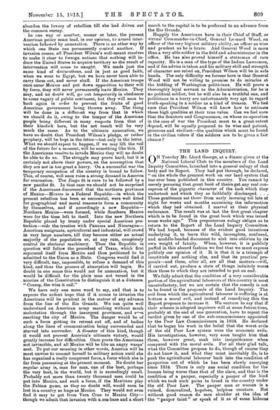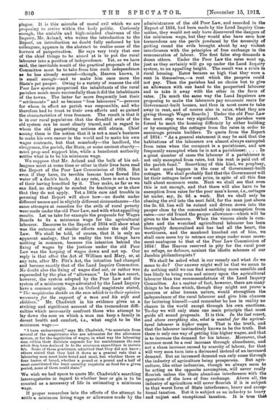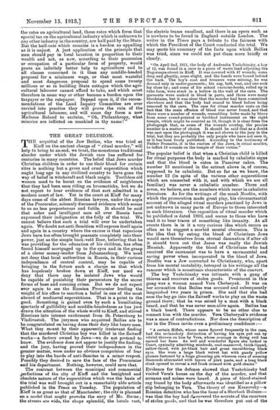THE LAND INQUIRY.
ON Tuesday Mr. Lloyd George, at a dinner given at the National Liberal Club to the members of the Land Inquiry Committee, launched into a general eulogy of that body and its Report. They had put through, he declared, " on the whole the greatest work on our land system that has ever been published in this country. You cannot by merely perusing that great book of theirs get any real con- ception of the gigantic character of the task which they undertook and which they so faithfully discharged. . . . These gentlemen sat there from early morning till late at night for weeks and months examining the information which they had obtained. I marvel at their physical endurance. The result was at last the first great chapter which is to be found in the great book which was issued some weeks ago." This preposterous eulogy obliges us to return to the Report of the Land Inquiry Committee. We had hoped, because of the evident good intentions underlying it, to leave this wild, incomplete, confused, and muddle-headed document to sink into oblivion by its own weight of fatuity. When, however, it is publicly puffed in this absurd fashion we feel that we must express publicly our opinion of it. It is that it is a triumph of ineptitude and nothing else, and that its practical pro- posals—and these, after all, are all that matters—will, If carried out, produce a state of things infinitely worse than those to which they are intended to put an end.
We fully admit that the condition of a very considerable portion of the agricultural labourers of this country is most unsatisfactory, but we are certain that the remedy is not to be found in the proposals of the Land Inquiry. The evil from which the agricultural labourer is suffering is at bottom a moral evil, and instead of remedying this the Report proposes to increase it. We venture to say that if their scheme is adopted inquirers will at some future time, probably at the end of one generation, have to repeat the verdict given by one of the sub-commissioners appointed by the Poor Law Commissioners in 1834. He declared that he began his work in the belief that the worst evils of the old Poor Law system were the economic evils. His investigations, however, very soon taught him that these, however great, sank into insignificance when compared with the moral evils. For all their glad talk, what the Committee propose to do, though of course they do not know it, and what they must inevitably do, is to push the agricultural labourer back into the condition of pauperism out of which he has been slowly emerging since 1834. There is only one social condition for the human being worse than that of the slave, and that is the condition of a pauper, especially a pauper of the kind which we took such pains to breed in the country under the old Poor Law. The pauper man or woman is a, ruined, demoralized, hopeless, helpless creature. Not without good reason do men shudder at the idea of the " pauper taint " or speak of it as of some hideous plague. It is this microbe of moral evil which we are proposing to revive within the body politic. Curiously enough, the amiable and high-minded chairman of the Inquiry, Mr. Acland, who writes the introduction to the Report, an introduction no doubt fully endorsed by his colleagues, appears in the abstract to realize some of the horrors of pauperization. He says very truly that one of the chief things to be aimed at is to put the rural labourer into a position of independence. Yet, as we have said, the inevitable result of the practical proposals of the Committee must be to take from him such independence as he has already secured—though, Heaven knows, it is small enough—and to make him once more the State's pet pauper. Owing to a variety of reasons the old Poor Law system pauperized the inhabitants of the rural parishes much more successfully than it did the inhabitants of the towns. The latter far more frequently lost their " settlements " and so became " free labourers "—persons for whom in effect no parish was responsible, and who therefore had to trust to their own efforts and so gained the characteristics of true freemen. The result is that it is in our rural population that the dreadful evils of the old system can be most clearly traced, and in regard to whom the old pauperizing notions still obtain. Chief among them is the notion that it is not a man's business to make his own career in the world and to make his own wages contracts, but that somebody—the landlord, the clergyman, the parish, the State, or some ancient charity— must prop and support him, while a beneficent authority settles what is to be his minimum wage.
We suppose that Mr. Acland and the bulk of his col- leagues must at some time or other in their lives have read the Report of the Poor Law Commission of 1834. But even if they have, its terrible lessons have flowed like water off a duck's back. At any rate, there is not a trace of their having benefited by it. They make, as far as we can find, no attempt to combat its teachings or to show that they do not apply. Yet a little care and trouble in perusing that Report will show how—no doubt under different names and in slightly different circumstances—the same attempts at remedies for the evils of rural poverty were made under the old Poor Law, and with what appalling results. Let us take for example the proposals for Wages Boards to fix a minimum wage for the agricultural labourer. Recourse to the Report of 1834 will show what was the outcome of similar efforts under the old Poor Law. We shall be told, of course, that it is only an apparent analogy, that in reality the two things have nothing in common, because the intention behind the fixing of wages by the justices under the old Poor Law was the keeping of wages down and not up. Our reply is that after the Act of William and Mary, or, at any rate, after Mr. Pitt's Act, the intention had changed and become exactly that of the Land Inquiry Committee. No doubt also the fixing of wages died out, or rather was superseded by the plan of "allowance." In the last resort, however, the system adopted by the Poor Law and the system of a minimum wage advocated by the Land Inquiry have a common origin. As an Oxford magistrate stated, "The magistrates decide on the sum which is in their opinion necessary for the support of a man and his wife and children." Mr. Chadwick in his evidence gives us a striking and significant account of the tremendous diffi- culties which necessarily confront those who attempt to lay down the sum on which a man can keep a family in decent health and comfort, i.e., what ought to be the minimum wage :— " I have endeavoured," says Mr. Chadwick, "to ascertain from several of the magistrates who are advocates for the allowance system, or for the regulation of wages, in what way the labouring man within their districts expends for his maintenance the sum which they have declared to be the minimum expenditure to sustain kfe. Some of these gentlemen admitted that they did not 'mow ; others stated that they laid it down as a general rule that a labouring man must have bread and meat, but whether three or four loaves of bread, whether a pound or a pound and a half of meat constituted the least quantity requisite as food for a given period, none of them could state."
We wish we had space to quote Mr. Chadwick's searching interrogatories in regard to whether beer or gin is to be counted as a necessary of life in estimating a minimum wage.
If proper researches into the effects of the attempt to settle a minimum living wage or allowance made by the administrators of the old Poor Law, and recorded in the Report of 1834, had been made by the Land Inquiry Com- mittee, they would not only have discovered the dangers of the minimum wage, but they would also have seen how tremendous are the perils produced by the necessity of getting round the evils brought about by any violent interference with the principles of free exchange in the remuneration of labour. The first false step demands a dozen others. Under the Poor Law the rates went up, just as they certainly will go up under the Land Inquiry system, to an appalling height. The result was a crisis in rural housing. Rates became so high that they were a rent in theinselves,—a rent which the paupers could not pay. Then the parishes had no choice but to give an allowance with one hand to the pauperized labourer and to take it away with the other in the form of rates. [In much the same way the Land Inquirers are proposing to make the labourers pay economic rents for Government-built houses, and thus in most cases to take away in rent, and of course also in rates, what they are giving through Wages Boards.] Under the old Poor Law the next step was very significant. The parishes were forced to meet the housing difficuity by either building or by exempting the cottages from the rates in order to encourage private builders. To quote from the Report of 1834: " As a general statement it may be said that the habitations of the labourers are almost always exempted from rates when the occupant is a parishioner, and are frequently exempted when he is not a parishioner. . . . In a great number of cases the labourer if a parishioner is not only exempted from rates, but his rent is paid out of the parish fund." Something of this kind, we prophesy, is what must happen in the case of Government-built cottages. We shall probably find that the Government will let their cottages below cost price, in spite of all this fine talk about economic rents. Next we shall see that even this is not enough, and that there will also have to be exemption from rates for the poor man's home, i.e., cottages let under, say, 2s. 6d. a week. But we shall only be chasing the evil into the next field, for the man just above the 2s. 6d. line will be ruined and driven down into the pauper class by the concealed subsidy in exemption from rates—our old friend the pauper allowance—which will be given to the labourers. When the vicious circle is com- plete and the wretched agricultural labourer has been thoroughly demoralized and has had all the heart, the worthiness, and the manhood knocked out of him, we shall once more try to retrace our steps under some move- ment analogous to that of the Poor Law Commission of 1834! Has Heaven reserved in pity for the rural poor no refuge, no defence, against the idiotic schemes of our Jacobin philanthropists We shall be asked what is our remedy and what do we mean to do ? Our answer might well be that we mean to do nothing until we can find something more sensible and less likely to bring ruin and misery upon the agricultural labourer than the recommendations of the Land Inquiry Committee. As a matter of fact, however, there are many things to be done which, though they might not prow a panacea or alter human nature, would strengthen the independence of the rural labourer and give him chances for bettering himself—and remember he has in reality no chance in the world except through his own exertions. To-day we will only state one main principle that must guide all sound proposals. It is this. In the last resort, and above everything else, what is wanted for the agricul- tural labourer is higher wages. That is the truth, and that the labourer instinctively knows to be the truth. But there is only one way of getting him higher wages, and that is to increase the demand for his labour. Moreover, that increase must be a real increase through abundance, and not a sham increase caused by scarcity of labour, for that will very soon turn into a decreased instead of an increased demand. But an increased demand can only come through the industry of agriculture being prosperous. But agri- culture, like other industries, though we always seem to be acting on the opposite assumption, will never really flourish unless the State abandons interference with the operation of the laws of free exchange. Above all, the industry of agriculture will never flourish if it is subject to that worst form of State interference, heavy and excep- tional taxation. But it is subject as an industry to heavy and unjust and exceptional taxation. It is true that
the rates on agricultural land, those rates which form that special tax on the agricultural industry which is unknown to any other industry in the country, are half paid by the State. But the half-rate which remains is a burden as appalling as it is unjust. A just application of the principle that men should pay in local taxation in proportion to their wealth and not, as now, according to their possession or occupation of a particular form of property, would prove an infinitely better help to agriculture and to all classes concerned in it than any muddle-headed proposal for a minimum wage, or that most wasteful and most dangerous proposal to spend some twenty millions or so in building State cottages which the agri- cultural labourer cannot afford to take, and which must therefore in some way or other become a burden upon the taxpayer or the ratepayer. Depend upon it, if the recom- mendations of the Land Inquiry Committee are ever carried into practice they will prove the ruin of the agricultural labourer, and will some day force a new Madame Roland to exclaim, " Oh, Philanthropy, what miseries are inflicted on mankind in thy name ! "
































































 Previous page
Previous page